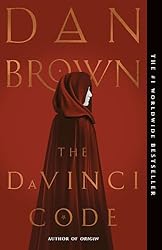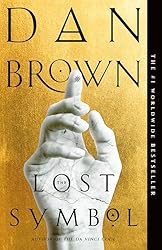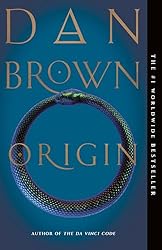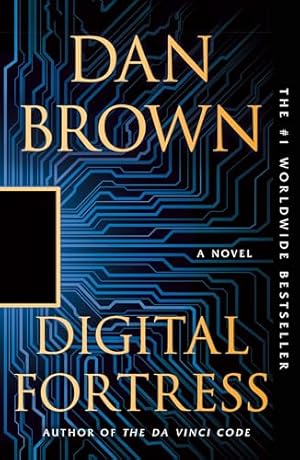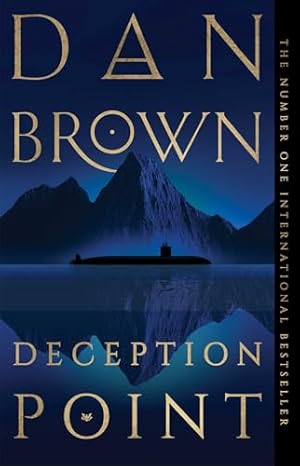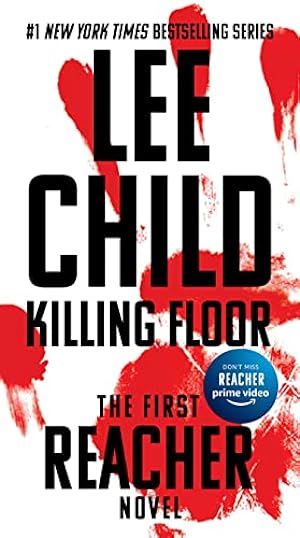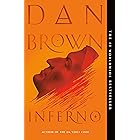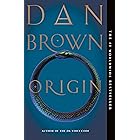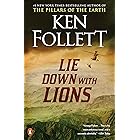Learn more
These promotions will be applied to this item:
Some promotions may be combined; others are not eligible to be combined with other offers. For details, please see the Terms & Conditions associated with these promotions.
Audiobook Price: $23.63$23.63
Save: $12.64$12.64 (53%)
Your Memberships & Subscriptions

Download the free Kindle app and start reading Kindle books instantly on your smartphone, tablet, or computer - no Kindle device required.
Read instantly on your browser with Kindle for Web.
Using your mobile phone camera - scan the code below and download the Kindle app.

Image Unavailable
Color:
-

-
-
- To view this video download Flash Player
-

-
 2 VIDEOS
2 VIDEOS -



 Audible sample
Audible sample The Lost Symbol (Robert Langdon Book 3) Kindle Edition
“Impossible to put down.” —The New York Times
“Thrilling and entertaining, like the experience on a roller coaster.” —Los Angeles Times
Famed Harvard symbologist Robert Langdon answers an unexpected summons to deliver a lecture at the U.S. Capitol Building. His plans are interrupted when a disturbing object—artfully encoded with five symbols—is discovered in the building. Langdon recognizes in the find an ancient invitation into a lost world of esoteric, potentially dangerous wisdom.
When his mentor, Peter Solomon—a long-standing Mason and beloved philanthropist—is kidnapped, Langdon realizes that the only way to save Solomon is to accept the mystical invitation and plunge headlong into a clandestine world of Masonic secrets, hidden history, and one inconceivable truth . . . all under the watchful eye of a terrifying enemy.
Robert Langdon returns in Inferno, Origin, and The Secret of Secrets (coming soon)!
- LanguageEnglish
- PublisherAnchor
- Publication dateSeptember 15, 2009
- File size3.4 MB
Shop this series
See full series- Kindle Price:$32.97By placing your order, you're purchasing a license to the content and you agree to the Kindle Store Terms of Use.
Shop this series
This option includes 3 books.
This option includes 5 books.
Customers who bought this item also bought
 WHAT WE HAVE DONE FOR OURSELVES ALONE DIES WITH US; WHAT WE HAVE DONE FOR OTHERS AND THE WORLD REMAINS AND IS IMMORTAL.Highlighted by 2,844 Kindle readers
WHAT WE HAVE DONE FOR OURSELVES ALONE DIES WITH US; WHAT WE HAVE DONE FOR OTHERS AND THE WORLD REMAINS AND IS IMMORTAL.Highlighted by 2,844 Kindle readers Phaistos Disk, the Dorabella Cipher, the mysterious Voynich Manuscript.Highlighted by 1,880 Kindle readers
Phaistos Disk, the Dorabella Cipher, the mysterious Voynich Manuscript.Highlighted by 1,880 Kindle readers “In the words of futurist Arthur C. Clarke, ‘Any sufficiently advanced technology is indistinguishable from magic.’ ”Highlighted by 1,497 Kindle readers
“In the words of futurist Arthur C. Clarke, ‘Any sufficiently advanced technology is indistinguishable from magic.’ ”Highlighted by 1,497 Kindle readers
From the Publisher




Editorial Reviews
Amazon.com Review
The Lost Symbol begins with an ancient ritual, a shadowy enclave, and of course, a secret. Readers know they are in Dan Brown territory when, by the end of the first chapter, a secret within a secret is revealed. To tell too much would ruin the fun of reading this delicious thriller, so you will find no spoilers here. Suffice it to say that as with many series featuring a recurring character, there is a bit of a formula at work (one that fans will love). Again, brilliant Harvard professor Robert Langdon finds himself in a predicament that requires his vast knowledge of symbology and superior problem-solving skills to save the day. The setting, unlike other Robert Langdon novels, is stateside, and in Brown's hands Washington D.C. is as fascinating as Paris or Vatican City (note to the D.C. tourism board: get your "Lost Symbol" tour in order). And, as with other Dan Brown books, the pace is relentless, the revelations many, and there is an endless parade of intriguing factoids that will make you feel like you are spending the afternoon with Robert Langdon and the guys from Mythbusters.
Nothing is as it seems in a Robert Langdon novel, and The Lost Symbol itself is no exception--a page-turner to be sure, but Brown also challenges his fans to open their minds to new information. Skeptical? Imagine how many other thrillers would spawn millions of Google searches for noetic science, superstring theory, and Apotheosis of Washington. The Lost Symbol is brain candy of the best sort--just make sure to set aside time to enjoy your meal. --Daphne Durham
From Publishers Weekly
From Bookmarks Magazine
Review
“Robert Langdon remains a terrific hero, a bookish intellectual who’s cool in a crisis and quick on his feet.... The codes are intriguing, the settings present often-seen locales in a fresh light, and Brown keeps the pages turning.” —Entertainment Weekly
“Thrilling in the extreme, a definite page-flipper.” —New York Daily News
“[The] Indiana Jones of intellectuals, Robert Langdon, rides again.... Revelations connecting faith and science...add dimension to this page-turner’s thrills.” —People
“Call it Brownian motion: a comet-tail ride of beautifully spaced reveals and a socko unveiling of the killer’s true identity.” —Washington Post
“The wait is over. The Lost Symbol is here—and you don’t have to be a Freemason to enjoy it.... Thrilling and entertaining, like the experience on a roller coaster.” —Los Angeles Times
“A roaring ride.... A caper filled with puzzles, grids, symbols, pyramids and a secret that can bestow ‘unfathomable power.’” —San Francisco Chronicle
“A fascinating pleasure.... Upends our usual assumptions about the world we think we know.” —Newsweek
“Dan Brown is a master of the breathless, puzzle-driven thriller.” —Richmond Times-Dispatch
About the Author
Excerpt. © Reprinted by permission. All rights reserved.
Since the beginning of time, the secret had always been how to die.
The thirty-four-year-old initiate gazed down at the human skull cradled in his palms. The skull was hollow, like a bowl, filled with bloodred wine.Drink it, he told himself. You have nothing to fear. As was tradition, he had begun this journey adorned in the ritualistic garb of a medieval heretic being led to the gallows, his loose-fitting shirt gaping open to reveal his pale chest, his left pant leg rolled up to the knee, and his right sleeve rolled up to the elbow. Around his neck hung a heavy rope noose—a "cable-tow" as the brethren called it. Tonight, however, like the brethren bearing witness, he was dressed as a master.The assembly of brothers encircling him all were adorned in their full regalia of lambskin aprons, sashes, and white gloves. Around their necks hung ceremonial jewels that glistened like ghostly eyes in the muted light. Many of these men held powerful stations in life, and yet the initiate knew their worldly ranks meant nothing within these walls. Here all men were equals, sworn brothers sharing a mystical bond.As he surveyed the daunting assembly, the initiate wondered who on the outside would ever believe that this collection of men would assemble in one place . . . much less this place. The room looked like a holy sanctuary from the ancient world.The truth, however, was stranger still.I am just blocks away from the White House.This colossal edifice, located at 1733 Sixteenth Street NW in Washington, D.C., was a replica of a pre-Christian temple—the temple of King Mausolus, the original mausoleum . . . a place to be taken after death. Outside the main entrance, two seventeen-ton sphinxes guarded the bronze doors. The interior was an ornate labyrinth of ritualistic chambers, halls, sealed vaults, libraries, and even a hollow wall that held the remains of two human bodies. The initiate had been told every room in this building held a secret, and yet he knew no room held deeper secrets than the gigantic chamber in which he was currently kneeling with a skull cradled in his palms.The Temple Room.This room was a perfect square. And cavernous. The ceiling soared an astonishing one hundred feet overhead, supported by monolithic columns of green granite. A tiered gallery of dark Russian walnut seats with hand-tooled pigskin encircled the room. A thirty-three-foot-tall throne dominated the western wall, with a concealed pipe organ opposite it. The walls were a kaleidoscope of ancient symbols . . . Egyptian, Hebraic, astronomical, alchemical, and others yet unknown.Tonight, the Temple Room was lit by a series of precisely arranged candles. Their dim glow was aided only by a pale shaft of moonlight that filtered down through the expansive oculus in the ceiling and illuminated the room's most startling feature—an enormous altar hewn from a solid block of polished Belgian black marble, situated dead center of the square chamber.The secret is how to die, the initiate reminded himself."It is time," a voice whispered.The initiate let his gaze climb the distinguished white-robed figure standing before him. The Supreme Worshipful Master. The man, in his late fifties, was an American icon, well loved, robust, and incalculably wealthy. His once-dark hair was turning silver, and his famous visage reflected a lifetime of power and a vigorous intellect."Take the oath," the Worshipful Master said, his voice soft like falling snow. "Complete your journey."The initiate's journey, like all such journeys, had begun at the first degree. On that night, in a ritual similar to this one, the Worshipful Master had blindfolded him with a velvet hoodwink and pressed a ceremonial dagger to his bare chest, demanding: "Do you seriously declare on your honor, uninfluenced by mercenary or any other unworthy motive, that you freely and voluntarily offer yourself as a candidate for the mysteries and privileges of this brotherhood?""I do," the initiate had lied."Then let this be a sting to your consciousness," the master had warned him, "as well as instant death should you ever betray the secrets to be imparted to you."At the time, the initiate had felt no fear. They will never know my true purpose here.Tonight, however, he sensed a foreboding solemnity in the Temple Room, and his mind began replaying all the dire warnings he had been given on his journey, threats of terrible consequences if he ever shared the ancient secrets he was about to learn: Throat cut from ear to ear . . . tongue torn out by its roots . . . bowels taken out and burned . . . scattered to the four winds of heaven . . . heart plucked out and given to the beasts of the field—"Brother," the gray-eyed master said, placing his left hand on the initiate's shoulder. "Take the final oath."Steeling himself for the last step of his journey, the initiate shifted his muscular frame and turned his attention back to the skull cradled in his palms. The crimson wine looked almost black in the dim candlelight. The chamber had fallen deathly silent, and he could feel all of the witnesses watching him, waiting for him to take his final oath and join their elite ranks.Tonight, he thought, something is taking place within these walls that has never before occurred in the history of this brotherhood. Not once, in centuries.He knew it would be the spark . . . and it would give him unfathomable power. Energized, he drew a breath and spoke aloud the same words that countless men had spoken before him in countries all over the world."May this wine I now drink become a deadly poison to me . . . should I ever knowingly or willfully violate my oath."His words echoed in the hollow space.Then all was quiet.Steadying his hands, the initiate raised the skull to his mouth and felt his lips touch the dry bone. He closed his eyes and tipped the skull toward his mouth, drinking the wine in long, deep swallows. When the last drop was gone, he lowered the skull.For an instant, he thought he felt his lungs growing tight, and his heart began to pound wildly. My God, they know! Then, as quickly as it came, the feeling passed.A pleasant warmth began to stream through his body. The initiate exhaled, smiling inwardly as he gazed up at the unsuspecting gray-eyed man who had foolishly admitted him into this brotherhood's most secretive ranks.Soon you will lose everything you hold most dear.
Chapter 1The Otis elevator climbing the south pillar of the Eiffel Tower was overflowing with tourists. Inside the cramped lift, an austere businessman in a pressed suit gazed down at the boy beside him. "You look pale, son. You should have stayed on the ground.""I'm okay . . ." the boy answered, struggling to control his anxiety. "I'll get out on the next level." I can't breathe.The man leaned closer. "I thought by now you would have gotten over this." He brushed the child's cheek affectionately.The boy felt ashamed to disappoint his father, but he could barely hear through the ringing in his ears. I can't breathe. I've got to get out of this box!The elevator operator was saying something reassuring about the lift's articulated pistons and puddled-iron construction. Far beneath them, the streets of Paris stretched out in all directions.Almost there, the boy told himself, craning his neck and looking up at the unloading platform. Just hold on.As the lift angled steeply toward the upper viewing deck, the shaft began to narrow, its massive struts contracting into a tight, vertical tunnel."Dad, I don't think—"Suddenly a staccato crack echoed overhead. The carriage jerked, swaying awkwardly to one side. Frayed cables began whipping around the carriage, thrashing like snakes. The boy reached out for his father."Dad!"Their eyes locked for one terrifying second.Then the bottom dropped out.Robert Langdon jolted upright in his soft leather seat, startling out of the semiconscious daydream. He was sitting all alone in the enormous cabin of a Falcon 2000EX corporate jet as it bounced its way through turbulence. In the background, the dual Pratt & Whitney engines hummed evenly."Mr. Langdon?" The intercom crackled overhead. "We're on final approach."Langdon sat up straight and slid his lecture notes back into his leather daybag. He'd been halfway through reviewing Masonic symbology when his mind had drifted. The daydream about his late father, Langdon suspected, had been stirred by this morning's unexpected invitation from Langdon's longtime mentor, Peter Solomon.The other man I never want to disappoint.The fifty-eight-year-old philanthropist, historian, and scientist had taken Langdon under his wing nearly thirty years ago, in many ways filling the void left by Langdon's father's death. Despite the man's influential family dynasty and massive wealth, Langdon had found humility and warmth in Solomon's soft gray eyes.Outside the window the sun had set, but Langdon could still make out the slender silhouette of the world's largest obelisk, rising on the horizon like the spire of an ancient gnomon. The 555-foot marble-faced obelisk marked this nation's heart. All around the spire, the meticulous geometry of streets and monuments radiated outward.Even from the air, Washington, D.C., exuded an almost mystical power.Langdon loved this city, and as the jet touched down, he felt a rising excitement about what lay ahead. The jet taxied to a private terminal somewhere in the vast expanse of Dulles International Airport and came to a stop.Langdon gathered his things, thanked the pilots, and stepped out of the jet's luxurious interior onto the foldout staircase. The cold January air felt liberating.Breathe, Robert, he thought, appreciating the wide-open spaces.A blanket of white fog crept across the runway, and Langdon had the sensation he was stepping into a marsh as he descended onto the misty tarmac."Hello! Hello!" a singsong British voice shouted from across the tarmac. "Professor Langdon?"Langdon looked up to see a middle-aged woman with a badge and clipboard hurrying toward him, waving happily as he approached. Curly blond hair protruded from under a stylish knit wool hat."Welcome to Washington, sir!"Langdon smiled. "Thank you.""My name is Pam, from passenger services." The woman spoke with an exuberance that was almost unsettling. "If you'll come with me, sir, your car is waiting."Langdon followed her across the runway toward the Signature terminal, which was surrounded by glistening private jets. A taxi stand for the rich and famous."I hate to embarrass you, Professor," the woman said, sounding sheepish, "but you are the Robert Langdon who writes books about symbols and religion, aren't you?"Langdon hesitated and then nodded."I thought so!" she said, beaming. "My book group read your book about the sacred feminine and the church! What a delicious scandal that one caused! You do enjoy putting the fox in the henhouse!"Langdon smiled. "Scandal wasn't really my intention."
The woman seemed to sense Langdon was not in the mood to discuss his work. "I'm sorry. Listen to me rattling on. I know you probably get tired of being recognized . . . but it's your own fault." She playfully motioned to his clothing. "Your uniform gave you away."
My uniform? Langdon glanced down at his attire. He was wearing his usual charcoal turtleneck, Harris Tweed jacket, khakis, and collegiate cordovan loafers . . . his standard attire for the classroom, lecture circuit, author photos, and social events.
The woman laughed. "Those turtlenecks you wear are so dated. You'd look much sharper in a tie!"
No chance, Langdon thought. Little nooses.
Neckties had been required six days a week when Langdon attended Phillips Exeter Academy, and despite the headmaster's romantic claims that the origin of the cravat went back to the silk fascalia worn by Roman orators to warm their vocal cords, Langdon knew that, etymologically, cravat actually derived from a ruthless band of "Croat" mercenaries who donned knotted neckerchiefs before they stormed into battle. To this day, this ancient battle garb was donned by modern office warriors hoping to intimidate their enemies in daily boardroom battles.
"Thanks for the advice," Langdon said with a chuckle. "I'll consider a tie in the future."
Mercifully, a professional-looking man in a dark suit got out of a sleek Lincoln Town Car parked near the terminal and held up his finger. "Mr. Langdon? I'm Charles with Beltway Limousine." He opened the passenger door. "Good evening, sir. Welcome to Washington."
Langdon tipped Pam for her hospitality and then climbed into the plush interior of the Town Car. The driver showed him the temperature controls, the bottled water, and the basket of hot muffins. Seconds later, Langdon was speeding away on a private access road. So this is how the other half lives.
As the driver gunned the car up Windsock Drive, he consulted his passenger manifest and placed a quick call. "This is Beltway Limousine," the driver said with professional efficiency. "I was asked to confirm once my passenger had landed." He paused. "Yes, sir. Your guest, Mr. Langdon, has arrived, and I will deliver him to the Capitol Building by seven P.M. You're welcome, sir." He hung up.
Langdon had to smile. No stone left unturned. Peter Solomon's attention to detail was one of his most potent assets, allowing him to manage his substantial power with apparent ease. A few billion dollars in the bank doesn't hurt either.
Langdon settled into the plush leather seat and closed his eyes as the noise of the airport faded behind him. The U.S. Capitol was a half hour away, and he appreciated the time alone to gather his thoughts. Everything had happened so quickly today that Langdon only now had begun to think in earnest about the incredible evening that lay ahead.
Arriving under a veil of secrecy, Langdon thought, amused by the prospect.
Ten miles from the Capitol Building, a lone figure was eagerly preparing for Robert Langdon's arrival.
From AudioFile
Product details
- ASIN : B002KQ6BT6
- Publisher : Anchor (September 15, 2009)
- Publication date : September 15, 2009
- Language : English
- File size : 3.4 MB
- Text-to-Speech : Enabled
- Screen Reader : Supported
- Enhanced typesetting : Enabled
- X-Ray : Enabled
- Word Wise : Enabled
- Print length : 658 pages
- Best Sellers Rank: #5,763 in Kindle Store (See Top 100 in Kindle Store)
- Customer Reviews:
About the author

Dan Brown is the author of eight #1 bestselling novels, including The Da Vinci Code, which has become one of the bestselling novels of all time as well as the subject of intellectual debate among readers and scholars. Brown’s novels are published in 56 languages around the world with over 250 million copies in print.
Brown was named one of the 100 Most Influential People in the World by TIME Magazine, whose editors credited him with “keeping the publishing industry afloat; renewed interest in Leonardo da Vinci and early Christian history; spiking tourism to Paris and Rome; a growing membership in secret societies; the ire of Cardinals in Rome; eight books denying the claims of the novel and seven guides to read along with it; a flood of historical thrillers; and a major motion picture franchise.”
The son of a mathematics teacher and a church organist, Brown was raised on a prep school campus where he developed a fascination with the paradoxical interplay between science and religion. These themes eventually formed the backdrop for his books. He is a graduate of Amherst College and Phillips Exeter Academy, where he later returned to teach English before focusing his attention full time to writing. He lives in New England.
Customer reviews
Customer Reviews, including Product Star Ratings help customers to learn more about the product and decide whether it is the right product for them.
To calculate the overall star rating and percentage breakdown by star, we don’t use a simple average. Instead, our system considers things like how recent a review is and if the reviewer bought the item on Amazon. It also analyzed reviews to verify trustworthiness.
Learn more how customers reviews work on AmazonCustomers say
Customers find the book entertaining and appreciate its thought-provoking journey, with brilliant writing and fascinating research throughout. The pacing receives mixed reactions - while some find it fast-paced, others say it's slow-moving at times. Characterization and development also get mixed reviews, with some finding the characters intriguing while others describe them as bland cardboard. The book's value for money receives negative feedback, with several customers describing it as boring and a waste of time.
AI-generated from the text of customer reviews
Customers find the book readable and entertaining, describing it as an interesting novel that gets good again.
"...He's also highly intelligent, rich, and seeking the hidden portal that supposedly leads to enlightenment and is discussed in the ancient doctrines..." Read more
"...Brown's specialty, are excellently crafted and immensely fun to try and solve before Langdon. Then there are the locations...." Read more
"...It does get buried in detail at times although still enjoyable." Read more
"...that were just a lot of fun, and on one level this is a light, entertaining read. The second half of the book didn't work as well for me...." Read more
Customers enjoy the suspenseful story of the book, describing it as exciting and thought-provoking, with brilliant storytelling and puzzle-filled elements.
"...On top of that, it's also a damn good read that has each chapter ending with a twist that literary compels the reader to go on to the next one...." Read more
"...Code, and in some ways it is; the writing is better, the story is more skillfully crafted (and more historically accurate), and there's lots more..." Read more
"Brown has written a very interesting tale with many twists and turns in the plot. It does get buried in detail at times although still enjoyable." Read more
"...Soon, he's embroiled in another elaborate, puzzle-filled, life-threatening hunt through the nation's capitol...." Read more
Customers praise the writing quality of the book, describing it as brilliantly and descriptively written, with one customer noting it reads like a movie script.
"...Buy the book, read it with an open mind, and you might walk away from it like I did, saying, "Wow!"" Read more
"...been better than The Da Vinci Code, and in some ways it is; the writing is better, the story is more skillfully crafted..." Read more
"...He preaches the importance of unity, open-mindedness, and understanding, and he manages to do this without proselytizing..." Read more
"...Therefore, I was disappointed after purchase to see the read aloud feature disabled for this novel. Boo hiss, Doubleday...." Read more
Customers find the book educational, appreciating its fascinating research and introduction to noetic science.
"...Brown definitely did his research and used the scientific evidence that's out there as a basis for his fantastic novel...." Read more
"So good, so much food for thought. Mostly so much hope for mankind! Feeling so much hope and love for humanity." Read more
"...Rapid-fire chapters, a nicely done link between ancient wisdom and the arcane emerging field of science known as "Noetics", the study of the..." Read more
"What a great book....loved all the DC references - will definitely make me look at things differently on my next visit...." Read more
Customers have mixed opinions about the characterization in the book, with some finding it over-explained, while one customer appreciates its ability to present far-reaching concepts.
"...It does get buried in detail at times although still enjoyable." Read more
"...Formulaic at times predictable, with characters speaking as if they just emerged from a cave to see a light that for seconds blinds them, The Lost..." Read more
"...The price was right on Kindle, as was the convenience factor, and I was hoping to have the machine read to me as I wasn't quite well enough to..." Read more
"...of skepticism and includes “science “ that is either misleading or outright false." Read more
Customers have mixed opinions about the pacing of the book, with some finding it fast-paced and excellent, while others note that it can be slow at times.
"...The tone and pace are tense and urgent as Langdon struggles to sort out the web of deception in order to save his mentor...." Read more
"...Rapid-fire chapters, a nicely done link between ancient wisdom and the arcane emerging field of science known as "Noetics", the study of the..." Read more
"...Strangely--unfortunately--The Lost Symbol is very slow to get going. The action doesn't begin in earnest until about a third of the way in...." Read more
"...Brown's other books were well-edited and moved along at breakneck speed. In each subsequent book, you could see him growing as a writer...." Read more
Customers have mixed opinions about the character development in the book, with some finding Robert Langdon wonderful and the villains expertly portrayed, while others describe them as bland cardboard characters.
"...He's also really full of himself, as can be deduced by such interior monologues as, "I am a masterpiece."..." Read more
"...typical 44-Magnum-toting pop thriller protagonist, the thin, stereotyped characters and lame dialog are classic Dan Brown...." Read more
"...he writes another spectacular whirlwind novel, replete with a crazed villain intent on destruction, a brilliant woman scientist that acts as sacred..." Read more
"...startling intellectual leaps, Langdon sometimes comes across as profoundly stubborn and rather slow...." Read more
Customers find the book to be a waste of time and not enthralling, with one customer noting it has very little substance.
"...The trouble gone through just doesn't seem worth it. Not only that, but the story rambles on when it feels like it should have ended 37 pages ago...." Read more
"...Bottom line: This isn't great literature, but Dan Brown achieves the near impossible...." Read more
"...The price was right on Kindle, as was the convenience factor, and I was hoping to have the machine read to me as I wasn't quite well enough to..." Read more
"...My only fault with The Lost Symbol was the ending. Overly long and fairly dull, fifteen pages of resolution and exposition, combined with a heaping..." Read more
Reviews with images
Book was Defective
Top reviews from the United States
There was a problem filtering reviews. Please reload the page.
- Reviewed in the United States on January 20, 2011I have to say right off the bat that a lot of readers apparently didn't like The Lost Symbol by Dan Brown. Maybe their expectations were so high after The Da Vinci Code that no author could live up to them. I don't know. For me, The Lost Symbol was a pure joy to read. I understand that people often view things differently from each other, but I'm amazed by the sheer outrage this book seems to have stirred up during the past year.
Anyway, The Lost Symbol takes place in Washington, D.C. and has Paul Langdon trying to save the life of his close friend, Peter Solomon, while attempting to unravel the hidden codes of the Freemasons and the effect they had on the founding of our nation. Sounds interesting, doesn't it?
When Paul Langdon is asked by an old friend/mentor to give a lecture in Washington, D.C. at the spur of the moment, Langdon agrees and flies to the nation's capital from Boston. Once he reaches the Capital building, Langdon quickly discovers something is wrong and that he's been duped by a very clever impostor who calls himself, Ma'lak. Ma'lak is a giant of man with his muscled body tattooed with archaic symbols. He's also highly intelligent, rich, and seeking the hidden portal that supposedly leads to enlightenment and is discussed in the ancient doctrines of Freemasonry. He firmly believes the portal is hidden somewhere in Washington, D.C. Ma'lak has threatened to kill Peter Solomon if Langdon doesn't assist him in locating the portal by midnight. To prove how serious he is about finding it, Ma'lak has left Peter Solomon's severed hand lying on the floor of the Capital building with clues to help Langdon along in his quest. Langdon, however, must deal with a C.I.A. section's chief, seeking to stop Ma'lak in achieving his goal, believing the results will tear the country apart. Langdon doesn't know what to think because all is not what it seems. It doesn't take Langdon long to realize he doesn't know whom to trust. With the clock ticking to the inevitable countdown, our Harvard professor races to unlock the secrets of our founding fathers and to find a portal that may exist or may not. If it does, then it will offer the answers to the ancient mysteries of mankind.
At the beginning of the book, the author clearly states that the scientific research he discusses in his novel is actually being carried out today. I just recently had a debate with someone who stated The Lost Symbol was nothing but fiction and had no bases for reality. I totally disagreed with him because though I don't have a background in science, I do try to stay abreast of the current research in quantum physics, astronomy, and the understanding of the human mind in its relationship to the Universe. I've also followed many of the discoveries that have been done in the area of Noetic Sciences throughout the last twenty-five years. What's discussed in The Lost Symbol blew me away its authenticity and how it's carefully woven into the plot. Brown definitely did his research and used the scientific evidence that's out there as a basis for his fantastic novel. This is part of the reason why the book was so entertaining. Clearly, not everyone who read the novel had the same reaction as I did, but what can I say.
If anyone out there has the slightest interest in man's quest to understand his place in the Universe, then check this book out for some interesting food for thought. On top of that, it's also a damn good read that has each chapter ending with a twist that literary compels the reader to go on to the next one. The Lost Symbol is certainly one of the best books I've read in the past decade, and I highly recommend it. Buy the book, read it with an open mind, and you might walk away from it like I did, saying, "Wow!"
- Reviewed in the United States on October 7, 2009The Lost Opportunity
In the year 2005, Dan Brown released his fourth novel, The Da Vinci Code. It soon became a world-wide sensation, outsold only by J.K. Rowling's fifth Harry Potter novel, Order of the Phoenix. Still, The Da Vinci Code is one of the most widely read books ever written. Clearly Brown hit on some sort of secret formula of entertainment. The question is, can he do it again? Does his latest novel and Code follow-up, The Lost Symbol, live up to the legacy? Well, yes...unfortunately.
The first thing one notices about this book is the jacket. Simply put, this book is beautiful. The seal of the Masonic Scottish Rite is stamped in red "wax", directly above the Capitol Building in Washington, D.C., which can be seen through a pyramidal rip in yellowed parchment. Layers of arcane symbols cover nearly every inch of the jacket, and the Washington Monument is visible through a keyhole on the spine. Nearly everything on the jacket has a meaning, including several hidden puzzles that the clever reader can decipher. They say not to judge a book by its cover, but if an exception was made for The Lost Symbol, then it would be a literary masterpiece.
But who cares how the book looks? What really matters is the story. Every Dan Brown novel centers on a secret society and its, well, secrets. This time it's the Freemasons, a world-wide organization whose roots stretch all the way back to the ancient Egyptians, and whose members range from your grandpa to the President of the United States (pick your favorite, they were all Masons). The Freemasons, however, are not so much a secret society as they are a "society with secrets", secrets that people would kill for.
The story starts with the usual shadowy ceremony, this time a mysterious tattooed man named Mal'akh being inducted into the 33rd degree of Freemasonry (this being the highest possible level). But, of course, Mal'akh has sinister, ulterior motives, as can be deduced by such interior monologues as, "They have opened their doors to me," and "Soon you will lose that which you hold most dear." Despite being something of a cookie-cutter villain, Mal'akh is actually quite terrifying, with an
intriguing back story and a knack for really ruining your day. He's also really full of himself, as can be deduced by such interior monologues as, "I am a masterpiece." Mal'akh does a lot of interior monologues.
The story then jumps to returning Harvard "symbologist" (no, there is no such thing) and lover of turtle necks, Robert Langdon. Langdon receives an urgent call from his old mentor Peter Solomon and is asked to come to Washington, D.C. right away, where he is needed to give an emergency presentation on (whom else?) the Freemasons. He catches the next flight and speeds off. Naturally things don't go too well. One kidnapping, severed hand and sinister phone call later, Langdon is racing against a 12-hour clock to rescue Peter Solomon by solving the Ancient Mysteries of the Freemasons, all for the benefit of Mal'akh.
Brown's work has been accused of using the exact same template, and The Lost Symbol is no exception. The great thing about The Lost Symbol, however, is that it manages to make a tired formula new and exciting. The tone and pace are tense and urgent as Langdon struggles to sort out the web of deception in order to save his mentor. The situations Mal'akh puts the characters through are nerve-wracking and sometimes disturbing. The puzzles and codes, being Brown's specialty, are excellently crafted and immensely fun to try and solve before Langdon. Then there are the locations. From the Masonic Temple to the Smithsonian Museum, each place that Langdon visits is a real location in Washington, and each is a fantastic set piece described in wonderful detail. Lots of surprising facts are revealed about the nation's capitol city. In fact, the entire story is full of detail that never becomes too overwhelming. There are also some small secrets (try dialing the phone number Langdon is given early in the story) and nods to the fans (a mention of one of Brown's earlier novels) that can be found throughout the story.
It's unfortunate, then, that the worst part is the ending. The Lost Symbol commits the same crime as The Da Vinci Code, by rewarding readers with--well, nothing. After the intense chase across Washington, after the deception and puzzle solving, when the Ancient Mysteries are finally revealed they don't live up to the grand name. The trouble gone through just doesn't seem worth it. Not only that, but the story rambles on when it feels like it should have ended 37 pages ago. The action comes to an abrupt halt, and suddenly the characters begin to wax philosophical. There's nothing wrong with some depth to a story, but the message Mr. Brown tries to convey seems to have been lost in translation. Even Langdon is left scratching his head at the confusing conjecture. It's tempting to recommend that readers simply stop reading after the final confrontation, but that would leave loose ends. It's a disappointing conclusion to an otherwise great story.
The Lost Symbol could have been better than The Da Vinci Code, and in some ways it is; the writing is better, the story is more skillfully crafted (and more historically accurate), and there's lots more action. But it ultimately loses points for an unsatisfactory finish and several pages of pointless rambling. Read the book and enjoy the ride, just don't expect too much at the end.
- Reviewed in the United States on May 6, 2025Brown has written a very interesting tale with many twists and turns in the plot. It does get buried in detail at times although still enjoyable.
Top reviews from other countries
 NicholasReviewed in Japan on October 19, 2024
NicholasReviewed in Japan on October 19, 20245.0 out of 5 stars A blast
Active and challenging, I can’t tire on reading any Dan Brown stuff.
-
 der TempelhoferReviewed in Germany on October 19, 2009
der TempelhoferReviewed in Germany on October 19, 20095.0 out of 5 stars Schluß mit dem Gemecker!
Was soll eigentlich das ganze besserwisserische Gemecker über Dan Brown? Niemand wird gezwungen diese Bücher zu lesen, ich hingegen liebe die Art wie er schreibt seit Jahren. Es gibt nur leider zu wenig Bücher von ihm. Natürlich sind sie alle irgendwie ähnlich angesetzt. Das ist bei Karl May auch so, und von dem habe ich in meiner Jugend ca. 50 Bände gelesen. Auch Ian Flemmings James Bond Bücher sind immer gleich konzipiert, das wurde sogar nach seinem Tod so beibehalten, als John Gardener das Recht bekam weitere Bücher zu schreiben. Auch John Grisham hat immer die selbe Mache drauf. Mag sein das unsere Literaturkritiker da höhere Weihen haben und sich unter Büchern etwas anderes vorstellen, aber von irgendwem muß ain Verlag auch Umsatz machen. Migt Auflagen von 500 Büchern bei Romanen die keinen interessieren geht das ganze jedenfalls nicht auf, da mag der literarische Anspruch der Exoten noch so hoch sein. Dan Brown schreibt so was wie "Harry Potter" für Erwachsene, mehr will er nicht sein und weniger verkaufen will er sicher auch nicht.
Eigentlich sollten die ganzen Kulturträger doch froh sein, wenn überhaupt noch jemand normale Bücher liest. Die breite Masse kommt doch über Reality- und Talentsuch-Shows der Privat-TV Sender sowieso nicht heraus. Ich lese weder Buddenbrocks noch den Butt, das ist nicht meine Welt. Meine Autoren heißen Irving, Grisham, Douglas Adams und eben Dan Brown. Achso Michael Chrichton hab ich auch gern gemocht, der ist nun leider auch gestorben, wie Adams zuvor. Ja, noch was muß ich gestehen - Harry Potter habe ich auch komplett gelesen und Lord of the Rings und jede Menge Star Wars Bücher - alles auf Englisch, schon allein weil da nicht so peinliche Übersetzungen passieren.
Ich hab jetzt keine Zeit mehr, da ich erst bei Kapitel 18 von LÖost Symbol bin...
 GizmoGeekReviewed in the United Kingdom on December 24, 2009
GizmoGeekReviewed in the United Kingdom on December 24, 20095.0 out of 5 stars A true masterpiece!
Writing is an art, and Dan Brown proves himself a master yet again in this thrilling novel featuring the highly resourceful (and extremely lucky) Harvard symbologist, professor Robert Langdon.
What sets apart Dan Brown's books is his ability to use real-world art work, monuments, and actual pieces of history and weave them seamlessly into a complicated web of secrets, philosophy and hope. His other recent books - Angels and Demons and The Da Vinci Code - bear testimony to his style that has become the trademark of Dan Brown.
In The Lost Symbol, this time the plot is based in Washington D.C. and revolves around a centuries-old Masonic secret and its revelations. Langdon, who is unexpectedly called to D.C. on short notice, discovers his dear friend has been kidnapped and in grave danger, the Harvard professor quickly finds himself unwittingly involved in a deep conspiracy involving an ancient secret, the CIA and an issue of national urgency.
Paired with the attractive Katherine Solomon, the duo use both scientific techniques as well as Langon's potent knowledge of symbology to crack the ancient mystery placed before them before its too late.
The pacing is quick and the reader is drawn into the world of ritualistic secrets, age-old philosophy, history, medieval art and theology.
What is impressive is the amount of research that has been put into writing this book - most (although not ALL) historical references are in fact accurate, and while the element of fiction does tend to overplay reality, it is to be expected in a work of fiction.
However, one aspect of The Lost Symbol I didn't particularly appreciate is the drawn-out closure of the book. In my opinion, the ending seems to linger on for some 20 pages after the climax, where the narration turns elaborately religious - almost to the point of becoming a lecture - where the author seems to have taken the liberty of preaching his personal opinion on the concept and Word of God, the role of man and other theo-philosophical concepts that aren't really central to the book...and which some people might find offensive.
However, I still give this 5-stars because I don't think its fair that some 20 odd pages should mar the rating of an otherwise excellent book.
A must read to all fans of Dan Brown books; and a good read for newcomers as well.
-
 MarauderWitchReviewed in Brazil on December 19, 2015
MarauderWitchReviewed in Brazil on December 19, 20155.0 out of 5 stars Muito bom
Esse não é o melhor trabalho de Dan Brown na minha opinião, mas ainda assim eu adoro o livro; cheio de reviravoltas e com um final surpreendente. A edição é linda! As ilustrações são excelentes para ajudar quem não conhece tão bem os locais que Robert Langdon se encontra e não quer pausar a leitura a todo momento para pesquisar na internet. Recomendo!
 Graham JonesReviewed in Australia on December 2, 2020
Graham JonesReviewed in Australia on December 2, 20205.0 out of 5 stars Excellent read
Good plot, fast pace







